Sir Richard Doll had an illustrious career. Through his efforts, the world learned much about the causes of cancer and the dangers of asbestos, radiation and, of course, smoking. Following his research into smoking and lung cancer during the 1950s, the realisation dawned that tobacco use was the public health problem of the era and not a harmless pastime. We all know what’s happened since. How many other 20th century epidemiologists have had such a transformative impact on peoples’ understanding of the determinants of disease?
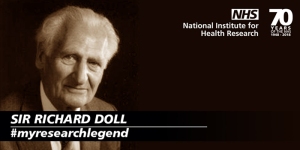
To what extent do I consider Sir Richard Doll to be a research ‘legend’? I’m not sure I’ve earned the right to bestow that honour, so I’ve taken advice. The Cambridge English Dictionary says a ‘legend’ is “someone very famous and admired, usually because of their ability in a particular area”. Just considering the one area of Doll’s work emphasised above, this is a no-brainer; ‘legend’ threshold is clearly surpassed. Don’t take my word for this, though, Google ‘Richard Doll’ and see if you can find reason to disagree.
Am I hasty in allocating ‘legend’ status? Doll certainly changed the world’s knowledge of many illnesses; shouldn’t an NIHR research legend demonstrate clear NHS impact too? Fortunately Doll’s influence here doesn’t disappoint, even if one again only considers smoking. I am a GP. How would this be different if Sir Richard had never lived? Firstly, I’d probably smoke. A pipe would give me more gravitas than cigarettes and I’d have to either smoke in my consulting room, like some doctors did, or schedule regular ‘pipe breaks’ into my day. I would be blissfully ignorant about harms from smoking and more likely to offer patients cigarettes than help with stopping, even if they developed lung cancer or heart disease.
Smoking Kills
Thankfully, Sir Richard did exist. Although I tried smoking as a teenager, a friend’s mum made me think again and I didn’t ever fully adopt the habit. Immature, teenage me was saved from smoking because Doll had shown how harmful smoking is. Fast forward to my GP work in 2018; again due to Doll, I fully realise that smoking kills my patients and wrecks their lives.
 Also, due to research which was only possible because of his early work, I can offer smokers numerous types of cessation support. It’s even possible to refer on to Stop Smoking Services (SSS) for specialist help, though a major cloud on the horizon is that these vital services are no longer universal; they are endangered.
Also, due to research which was only possible because of his early work, I can offer smokers numerous types of cessation support. It’s even possible to refer on to Stop Smoking Services (SSS) for specialist help, though a major cloud on the horizon is that these vital services are no longer universal; they are endangered.
Through their work at the Statistical research Unit of the MRC, Doll and Hill demonstrated that smoking causes lung cancer; before this smoking was ubiquitous across social classes and many doctors smoked. By 1954, the government accepted the link and the middle classes started quitting in droves. When he died in 2005, Doll would very likely have been delighted that UK smoking rates were falling fast. However, improvements were chiefly amongst the better off, so smoking had become disproportionately concentrated amongst society’s poorest. Given his well-documented non-conformist views, my bet is that he would have been saddened that those with most to gain benefited least from such massive social change. Nevertheless, he might have been heartened by the government’s national and vigorous action against smoking. Back then, although SSS were a very new NHS entity, it was mandatory for Primary Care Trusts to deliver them and SSS were closely performance-managed by the then Department of Health. Any smoker could access services’ evidenced-based support to increase their chances of permanent cessation.
Smoking Prevention
Worldwide, legions of researchers, including me, have followed Doll by trying to find ways of treating or preventing smoking. Few epidemiologists have caused such a seismic shift in the international research agenda. Take a look at the thousands of randomised controlled trials (RCTs) reviewed in the tobacco section of the Cochrane Library. All of these studies test interventions against smoking. This necessary work continues today and NIHR is a leading supporter funding, for example, the largest ever RCTs of Nicotine Replacement Therapy used in pregnancy* or for ‘preloading’.
The NHS is 70. Celebrating research legends is a great idea but it’s important we remember what they did and why they are lauded. It took almost half a century after Doll and Hill’s landmark paper for the NHS to implement national treatment services for smokers, and sadly less than 20 years later these have become an optional extra with patchy coverage across the country. Smoking is less prevalent than in the past but there are still millions of UK citizens who want to stop and can’t manage this alone. Smoking is still a national problem and requires a national NHS response. A crucial component of this response should be to help quitters by giving them the very best support.
Sir Richard’s work has had a great impact, as all research should. The demise of SSS suggests we risk forgetting this when instead we should continue to build on his significant achievements.
*More information on the trial: Double-blind, randomised, placebo-controlled trial of nicotine replacement therapy (NRT) in pregnancy – SNAP is available on the NIHR Journals Library website.
Tim Coleman, Professor of Primary Care, Faculty of Medicine & Health Sciences
University of Nottingham and NIHR Senior Investigator
The NIHR is highlighting seven research legends whose work has shaped the NHS, as part of its celebrations for the NHS’s 70th birthday and the NIHR’s I Am Research campaign.
Original post on NIHR website. – Posted: 04 May 2018


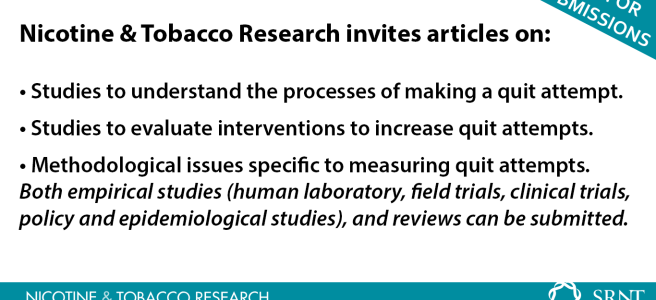


 Also, due to research which was only possible because of his early work, I can offer smokers numerous types of cessation support. It’s even possible to refer on to Stop Smoking Services (SSS) for specialist help, though a major cloud on the horizon is that these vital services are no longer universal; they are endangered.
Also, due to research which was only possible because of his early work, I can offer smokers numerous types of cessation support. It’s even possible to refer on to Stop Smoking Services (SSS) for specialist help, though a major cloud on the horizon is that these vital services are no longer universal; they are endangered.





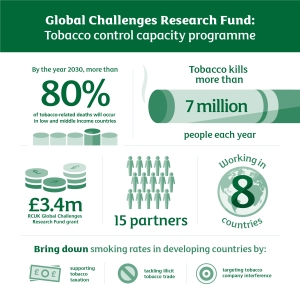 Led by Professor Linda Bauld, UKCTAS Deputy Director based at the University of Stirling, this Global Challenges Research Fund grant provides an example of how UKCTAS is able to bring together members of the UK tobacco control research community to respond to an opportunity to address tobacco use in low and middle income countries.It involves six of the academic teams within the UKCTAS consortia and Cancer Research UK, one of the UKCTAS funders. CRUK is already very active in international tobacco control research.
Led by Professor Linda Bauld, UKCTAS Deputy Director based at the University of Stirling, this Global Challenges Research Fund grant provides an example of how UKCTAS is able to bring together members of the UK tobacco control research community to respond to an opportunity to address tobacco use in low and middle income countries.It involves six of the academic teams within the UKCTAS consortia and Cancer Research UK, one of the UKCTAS funders. CRUK is already very active in international tobacco control research.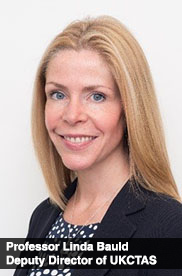 “UKCTAS has made an important contribution to informing policies and new developments to reduce smoking rates in the UK over the past decade, culminating in the very significant prevalence reductions we’ve seen in the past few years. This is testament to the links we have worked hard to forge with government, NGOs, advocacy groups, professionals and the public who have helped translate our research into practice. Our work on smokefree public places, tobacco taxation, mass media, smoking cessation & stop smoking services, electronic cigarettes & tobacco harm reduction, and our monitoring of tobacco industry activity has all fed into these changes.
“UKCTAS has made an important contribution to informing policies and new developments to reduce smoking rates in the UK over the past decade, culminating in the very significant prevalence reductions we’ve seen in the past few years. This is testament to the links we have worked hard to forge with government, NGOs, advocacy groups, professionals and the public who have helped translate our research into practice. Our work on smokefree public places, tobacco taxation, mass media, smoking cessation & stop smoking services, electronic cigarettes & tobacco harm reduction, and our monitoring of tobacco industry activity has all fed into these changes. 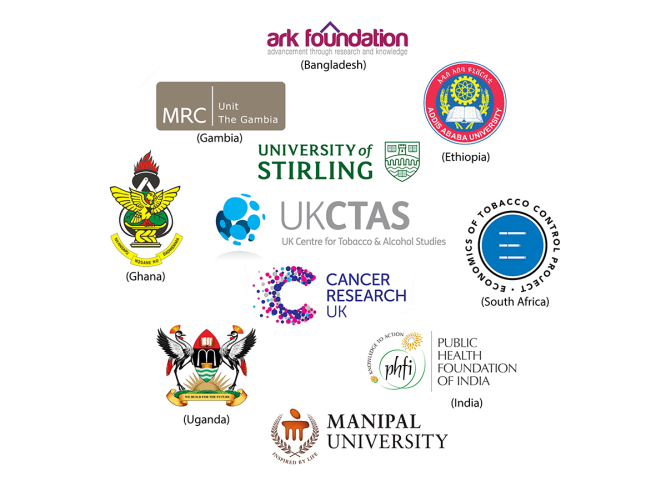
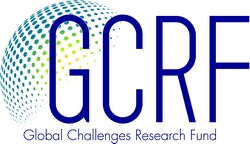 Research Councils UK Collective Fund is supporting projects in the range of £2 – 8 million over four years. It aims to build upon research knowledge in the UK, and strengthen capacity overseas, to help address challenges, informed by expressed need in the developing countries.
Research Councils UK Collective Fund is supporting projects in the range of £2 – 8 million over four years. It aims to build upon research knowledge in the UK, and strengthen capacity overseas, to help address challenges, informed by expressed need in the developing countries.